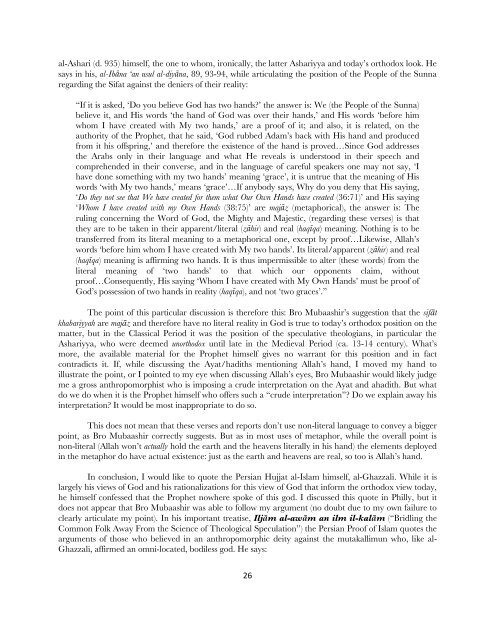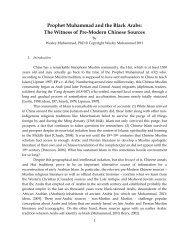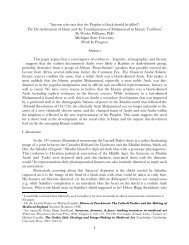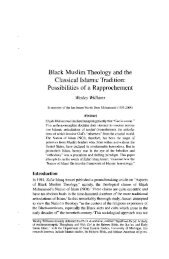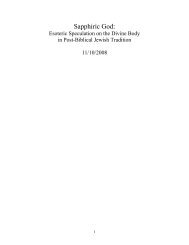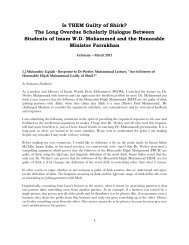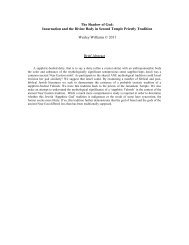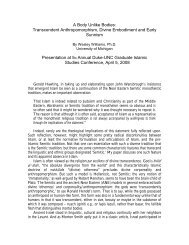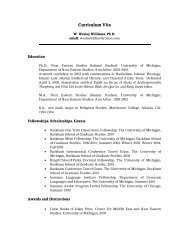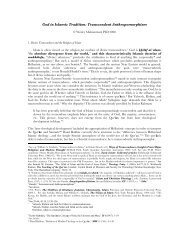Is THEM Guilty of Shirk? - Dr. Wesley Muhammad
Is THEM Guilty of Shirk? - Dr. Wesley Muhammad
Is THEM Guilty of Shirk? - Dr. Wesley Muhammad
You also want an ePaper? Increase the reach of your titles
YUMPU automatically turns print PDFs into web optimized ePapers that Google loves.
al-Ashari (d. 935) himself, the one to whom, ironically, the latter Ashariyya and today‘s orthodox look. He<br />
says in his, al-Ibāna „an usul al-diyāna, 89, 93-94, while articulating the position <strong>of</strong> the People <strong>of</strong> the Sunna<br />
regarding the Sifat against the deniers <strong>of</strong> their reality:<br />
―If it is asked, ‗Do you believe God has two hands?‘ the answer is: We (the People <strong>of</strong> the Sunna)<br />
believe it, and His words ‗the hand <strong>of</strong> God was over their hands,‘ and His words ‗before him<br />
whom I have created with My two hands,‘ are a pro<strong>of</strong> <strong>of</strong> it; and also, it is related, on the<br />
authority <strong>of</strong> the Prophet, that he said, ‗God rubbed Adam‘s back with His hand and produced<br />
from it his <strong>of</strong>fspring,‘ and therefore the existence <strong>of</strong> the hand is proved…Since God addresses<br />
the Arabs only in their language and what He reveals is understood in their speech and<br />
comprehended in their converse, and in the language <strong>of</strong> careful speakers one may not say, ‗I<br />
have done something with my two hands‘ meaning ‗grace‘, it is untrue that the meaning <strong>of</strong> His<br />
words ‗with My two hands,‘ means ‗grace‘…If anybody says, Why do you deny that His saying,<br />
‗Do they not see that We have created for them what Our Own Hands have created (36:71)‘ and His saying<br />
‗Whom I have created with my Own Hands (38:75)‘ are majāz (metaphorical), the answer is: The<br />
ruling concerning the Word <strong>of</strong> God, the Mighty and Majestic, (regarding these verses) is that<br />
they are to be taken in their apparent/literal (zāhir) and real (haqīqa) meaning. Nothing is to be<br />
transferred from its literal meaning to a metaphorical one, except by pro<strong>of</strong>…Likewise, Allah‘s<br />
words ‗before him whom I have created with My two hands‘. Its literal/apparent (zāhir) and real<br />
(haqīqa) meaning is affirming two hands. It is thus impermissible to alter (these words) from the<br />
literal meaning <strong>of</strong> ‗two hands‘ to that which our opponents claim, without<br />
pro<strong>of</strong>…Consequently, His saying ‗Whom I have created with My Own Hands‘ must be pro<strong>of</strong> <strong>of</strong><br />
God‘s possession <strong>of</strong> two hands in reality (haqīqa), and not ‗two graces‘.‖<br />
The point <strong>of</strong> this particular discussion is therefore this: Bro Mubaashir‘s suggestion that the sifāt<br />
khabariyyah are majāz and therefore have no literal reality in God is true to today‘s orthodox position on the<br />
matter, but in the Classical Period it was the position <strong>of</strong> the speculative theologians, in particular the<br />
Ashariyya, who were deemed unorthodox until late in the Medieval Period (ca. 13-14 century). What‘s<br />
more, the available material for the Prophet himself gives no warrant for this position and in fact<br />
contradicts it. If, while discussing the Ayat/hadiths mentioning Allah‘s hand, I moved my hand to<br />
illustrate the point, or I pointed to my eye when discussing Allah‘s eyes, Bro Mubaashir would likely judge<br />
me a gross anthropomorphist who is imposing a crude interpretation on the Ayat and ahadith. But what<br />
do we do when it is the Prophet himself who <strong>of</strong>fers such a ―crude interpretation‖? Do we explain away his<br />
interpretation? It would be most inappropriate to do so.<br />
This does not mean that these verses and reports don‘t use non-literal language to convey a bigger<br />
point, as Bro Mubaashir correctly suggests. But as in most uses <strong>of</strong> metaphor, while the overall point is<br />
non-literal (Allah won‘t actually hold the earth and the heavens literally in his hand) the elements deployed<br />
in the metaphor do have actual existence: just as the earth and heavens are real, so too is Allah‘s hand.<br />
In conclusion, I would like to quote the Persian Hujjat al-<strong>Is</strong>lam himself, al-Ghazzali. While it is<br />
largely his views <strong>of</strong> God and his rationalizations for this view <strong>of</strong> God that inform the orthodox view today,<br />
he himself confessed that the Prophet nowhere spoke <strong>of</strong> this god. I discussed this quote in Philly, but it<br />
does not appear that Bro Mubaashir was able to follow my argument (no doubt due to my own failure to<br />
clearly articulate my point). In his important treatise, Iljām al-awām an ilm il-kalām (―Bridling the<br />
Common Folk Away From the Science <strong>of</strong> Theological Speculation‖) the Persian Pro<strong>of</strong> <strong>of</strong> <strong>Is</strong>lam quotes the<br />
arguments <strong>of</strong> those who believed in an anthropomorphic deity against the mutakallimun who, like al-<br />
Ghazzali, affirmed an omni-located, bodiless god. He says:<br />
26


